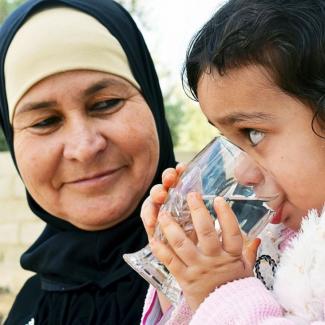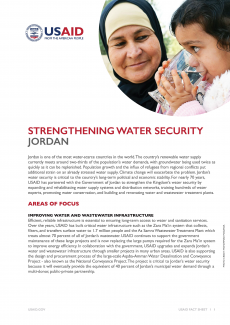BACKGROUND
Jordan is one of the most water-scarce countries in the world. The country’s renewable water supply currently meets around two-thirds of the population’s water demands, with groundwater being used twice as quickly as it can be replenished. Population growth and the influx of refugees from regional conflicts put additional strain on an already stressed water supply. Climate change will exacerbate the problem. Jordan’s water security is critical to the country’s long-term political and economic stability.
For nearly 70 years, USAID has partnered with the Government of Jordan to strengthen the Kingdom’s water security by expanding and rehabilitating water supply systems, training hundreds of water experts, and building and renovating water networks and water and wastewater treatment plants. Today, USAID continues this partnership by improving water and wastewater infrastructure, strengthening water sector governance to build self-sufficiency in managing water resources, and promoting water conservation so that the people of Jordan have sustainable access to the water they need to build strong, resilient communities. USAID is also helping ensure the continuity of Jordan’s water supply during the COVID-19 pandemic.
AREAS OF FOCUS
Improving Water and Wastewater Infrastructure
Efficient, reliable infrastructure is essential to ensuring long-term access to water and sanitation services. USAID upgrades and expands Jordan’s water and wastewater infrastructure through projects like the Zara Ma’in Water Treatment Plant and the As Samra Wastewater Treatment Plant to increase the availability of drinking water and improve sanitation for millions of Jordanians.
Strengthening Governance
Jordan loses up to half of its water to non-revenue water – water lost through leaky pipes, theft, and under-billing. In order to reduce water losses and facilitate sustainable water management, USAID works with the Ministry of Water and Irrigation to strengthen water sector regulations, restructure and rehabilitate water networks and pump stations, and introduce smart metering and rapid leak detection. In addition, USAID is helping the Ministry and water utilities implement management reforms to build a sustainable and self-sufficient water sector in Jordan. More than 9000 water sector personnel were trained in 2020 on tools and methods to improve water resource management.
Promoting Water Conservation
Jordan’s agriculture sector consumes over 50 percent of the country’s water supply. Studies show that farmers often use two to five times more water than is needed. USAID provides support services to scale up the use of water-saving technologies by farmers and households in order to conserve the country’s limited water resources. By promoting behavioral change among water consumers and policy makers, and partnering with the private sector, USAID is cultivating stewardship of shared water resources to ensure water remains available for the people of Jordan.
NOTEWORTHY ACHIEVEMENTS:
- USAID has improved water and sanitation services by building water and wastewater networks, treatment plants, and pumping stations. Recent examples include the construction of wastewater treatment plants in Jerash, Tafilah, and North Aqaba. These plants improve sanitation for millions of Jordanians and increase the availability of drinking water by substituting fresh water with treated wastewater for irrigation and industrial uses. -USAID supported the installation of the Water Authority of Jordan's Control Center. The new operational system connects Supervisory Control and Data Acquisition (SCADA) systems across Jordan, enabling aggregated monitoring and reporting, which will improve management of scarce water resources.
- USAID has installed 8,500 kilometers of water piping and 120,000 high-accuracy smart meters, procured leak detection equipment and vehicles, and upgraded water monitoring and control systems throughout Jordan, saving enough water in 2020 to supply more than 215,000 people each year.
- Social media campaigns supported by USAID have raised Jordanian awareness of the water crisis facing the country and encouraged water-saving practices. Adoption of water-saving technologies through USAID programs in 2020 saved enough water to supply more than 260,000 people each year. -USAID helped the Aqaba Water Company (AWC) to integrate its water and wastewater system from source to households to treatment to reuse. Through this partnership, USAID and AWC installed state-of-the-art monitoring systems and overhauled management and business practices that, along with a customer campaign to encourage water conservation, resulted in 50 percent less water being lost to leaks, theft, and improper metering. Through this integrated approach AWC became the only water utility in Jordan that consistently covers its own operational costs.

Mohammad Maghayda for USAID

